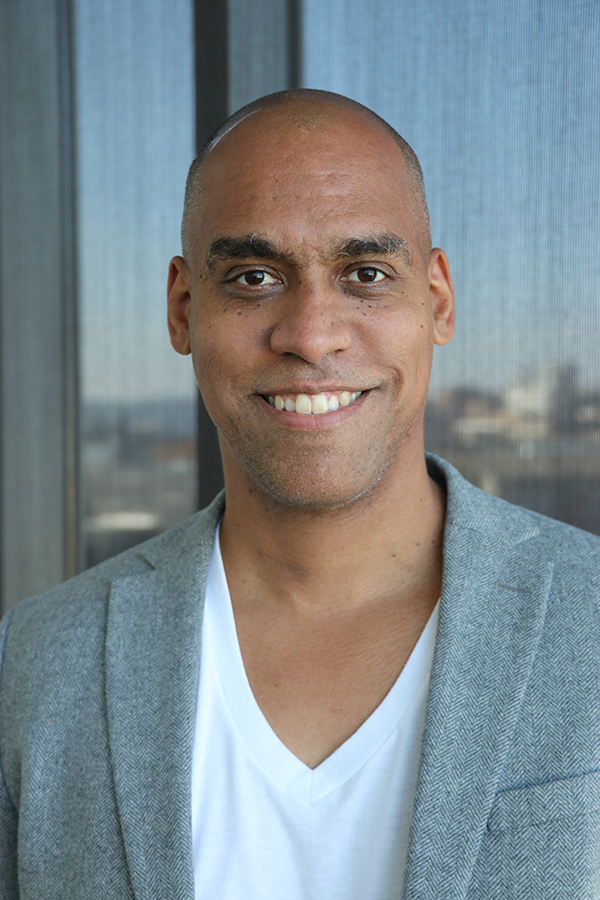New Robotics Institute Director Ready To Shape Future of Robotics CMU Alum Matthew Johnson-Roberson To Head Institute in January
Aaron AupperleeThursday, November 11, 2021Print this page.

Much has changed since Matthew Johnson-Roberson last walked the halls of Carnegie Mellon University's Robotics Institute.
In the 15-plus years since Johnson-Roberson graduated, robots have proven they work. They can navigate city streets and sidewalks. They can fly autonomously to inspect bridges, buildings and tunnels. And they help in homes, hospitals and offices.
Johnson-Roberson, who earned a bachelor's degree in computer science from CMU's School of Computer Science in 2005, will have a chance to shape the next generation of robotics and roboticists when he returns to campus in January as the new director of the Robotics Institute.
"We're at a really important inflection point in the trajectory of robotics," Johnson-Roberson said. "It is a larger field. There are more students interested in robotics, and people are building systems that work. We have an opportunity to determine how we want to deploy robotics in the world and how can we use that technology to produce the most good."
Johnson-Roberson will be the Robotics Institute's sixth director. Professor Srinivasa Narasimhan has served as an interim director of RI since 2019, when Martial Hebert left his post as head of the institute to become dean of SCS.
"Matt's expansive background and expertise equip him well to lead the development of robotic systems across RI and SCS," Hebert said. "The Robotics Institute, the School of Computer Science and the entire Carnegie Mellon community are thrilled to welcome Matt back to campus and excited to work with him."
Johnson-Roberson is currently an associate professor of engineering in the University of Michigan's (UM) Department of Naval Architecture and Marine Engineering and the Department of Electrical Engineering and Computer Science. He co-directs the UM Ford Center for Autonomous Vehicles, and both founded and leads the Deep Robot Optical Perception (DROP) Lab. Johnson-Roberson also co-founded Refraction AI, a delivery robotics company focusing on last-mile logistics.
After graduating from CMU, Johnson-Roberson earned his Ph.D. at the University of Sydney. He completed a post-doctoral fellowship at the KTH Royal Institute of Technology's Centre for Autonomous Systems in Stockholm and a research fellowship at the University of Sydney's Australian Centre for Field Robotics. Johnson-Roberson joined the faculty at UM in 2013 and taught courses related to underwater vehicle design and autonomy, computer vision, and self-driving cars.
"It's an honor to come back and work with some of the same people who inspired me," Johnson-Roberson said. "Part of this job will be figuring out how to affect change and preserve what was amazing about RI in first place. I want to keep the best bits while looking forward."
Johnson-Roberson caught the robotics bug during his junior year at CMU. He wanted to use computer science to do something bold and make the world a better place. In the halls of the RI, he stumbled across Professor Red Whittaker and the Red Team autonomous vehicle racing program. Johnson-Roberson stuck with the program, working on Sandstorm and H1ghlander — the team's entries in the 2004 and 2005 DARPA Grand Challenges where driverless vehicles raced through the desert near the California/Nevada border.
Whittaker called Johnson-Roberson a "technological adventurer" and said the enthusiasm and determination with which he devoted himself to his projects impressed him. For Johnson-Roberson, the work was an opportunity to get involved in top-level research as an undergrad. And it was a chance to attempt the impossible.
"It was a moonshot. It was very unclear if it was going to work," Johnson-Roberson said. "But it altered the entire structure of my career. After the 2004 challenge, robotics was it. I was locked into what I wanted to do. If I had not done that challenge, I don't know what I would be doing."
A project with Professor Chris Atkeson further sharpened Johnson-Roberson's focus. The two worked on a camera system to detect falls in nursing homes. The project showed Johnson-Roberson how robotic systems could be deployed in the world to help people. Atkeson said Johnson-Roberson was an independent undergrad who clearly wanted to develop technology to make people's lives better.
"You don't often find people that are so passionate," Johnson-Roberson said of Whittaker and Atkeson. "And that passion is just incredibly contagious."
Now Johnson-Roberson returns to CMU to lead the department responsible for shaping so much of his research and work. As robots become more common in everyday life, roboticists continue to wrestle with questions around the potential societal consequences they pose and the equality of their benefits. The younger generation of students is pushing these challenges to the forefront while also expressing changing expectations for the field, the university and the faculty.
Johnson-Roberson likes the constant influx of new students with new perspectives. Young people are incredibly passionate and excited about seeing and affecting change in the world, and Johnson-Roberson is excited to make that happen in RI.
"I want to build an environment that brings more voices to the table. That benefits everybody in the community," Johnson-Roberson said. "As we begin to expand inclusion, you begin to see the chaos, but hopefully and ultimately, the benefits of having a more diverse conversation. And that leads to what I think universities do so well — inspire thought, discussion, debate and conflict that leads to better and newer ideas."
Johnson-Roberson said he is looking forward to celebrating Spring Carnival once again but was disappointed to learn that the O is no more. He doesn't know where he will get his late-night, greasy food fix.
Aaron Aupperlee | 412-268-9068 | aaupperlee@cmu.edu
